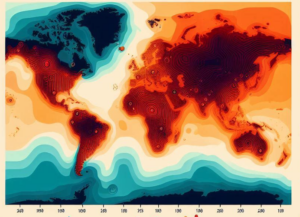 The month of October, global temperatures shattered all previous records, with the planet experiencing an average of 1.7 degrees Celsius (3.1 degrees Fahrenheit) above the historical norm for the period before industrialization, marking it as the warmest October ever observed. This period also represents the fifth consecutive month of unprecedented warmth, paving the way for 2023 to potentially claim the title of the hottest year humanity has ever faced.
The month of October, global temperatures shattered all previous records, with the planet experiencing an average of 1.7 degrees Celsius (3.1 degrees Fahrenheit) above the historical norm for the period before industrialization, marking it as the warmest October ever observed. This period also represents the fifth consecutive month of unprecedented warmth, paving the way for 2023 to potentially claim the title of the hottest year humanity has ever faced.
The temperature surges of October alone exceeded the former peak set in 2019 by a significant margin of 0.4 degrees Celsius (0.7 degrees Fahrenheit). Samantha Burgess, the deputy director of the Copernicus Climate Change Service, which regularly reports on global temperature trends including oceanic and atmospheric conditions, expressed astonishment at the scale of these record-breaking increases.
Burgess remarked on the disturbing trend of how rapidly and consistently temperature records are being rewritten.
As the progressive accumulation of heat continues over the months, the Copernicus Climate Change Service virtually assures that the year 2023 will surpass all others in the recorded history as the most sweltering.
Specialists in climatology scrutinize various weather and environmental indicators to better understand the trajectory our planet is on, particularly as influenced by anthropogenic emissions of greenhouse gases. The escalation in global temperatures leads directly to heightened incidences of violent and unpredictable weather patterns such as fierce storms or intensified dry spells, underscored Peter Schlosser of the Global Futures Laboratory at Arizona State University, who is not affiliated with the initiatives of Copernicus.
Schlosser warned that humanity is transitioning towards a climatic phase marked by greater adversities affecting a larger demographic, urging that we heed alarms that should have been acknowledged decades previously.
The exceptional heat experienced this year is partially attributed to rising ocean temperatures, which traditionally have acted as a buffer by absorbing about 90% of the climate change-induced surplus heat, as noted by Burgess. However, during an El Nino cycle, which naturally heats certain sections of the oceans influencing worldwide weather phenomena, we can anticipate additional temperature increments in the forthcoming periods, she advised.
Schlosser suggests that as ocean temperatures continue to climb, more record-breaking weather events are imminent, but it remains to be seen whether these will occur in gradual increments. He highlighted that we already breezed past the preferred cap of 1.5 degrees Celsius (2.7 degrees Fahrenheit) increase since pre-industrial times targeted by the Paris climate agreement, and the complete scope of these changes has yet to be fully experienced.
As scientists like Schlosser, Burgess, and others emphasize the urgent necessity for concrete measures to reduce emissions responsible for planetary heating, Friederike Otto from Imperial College London points to the considerable economic detriment of persisting with the use of fossil fuels. She suggests that the real cost is not visible when considering the record temperatures alone but becomes painfully evident when accounting for the suffering of people and environmental systems—emphasizing the crucial importance of focusing on these impacts.